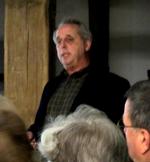Posted on Friday, December 9, 2011
Dr. Jeffrey C. Dick, professor of geology at Youngstown State University, presented an informational lecture Dec. 6 in the Nature Center. The topic was "Hydraulic Fracturing or Shale Gas Development" in our area. The audience was a mix of college and community.
For the past two months a citizens group, Fracking Truth Alliance of Lawrence and Mercer Counties, has been meeting weekly in the Nature Center of the Field Station to air concerns and gain information on fracking, technically known as hydraulic fracturing, a process of tapping ancient natural gas reservoirs in Marcellus and Utica shale rock a mile or more below our surface in Pennsylvania and Ohio.
Although the word "fracking" has been around for several decades, few people in our area would have recognized it 10 years ago. Now it is a hot topic. Now it is real for residents and landowners who are faced with an economic boon or a possible environmental crisis. There are conflicting opinions.
People, rightly, want to know answers to questions like: Will fluids used in fracking, some of which are toxic, contaminate my drinking water? Can these chemicals cause illnesses and cancer? Is the process of hydraulic fracturing well regulated? Are we moving too fast in a direction that is placing economics ahead of the environment? What should landowners know before they sign a lease to a commercial drilling or exploration company? Are there hidden costs to the community such as damage to roads and other parts of our infrastructure? To some of these questions there are answers. To other questions there are no satisfying answers.
Dick laid out the technical details of rock layers millions of years old and the basic processes of drilling - first vertically and then horizontally - and injecting large amounts of a liquid mix under high pressure into cracks in the rock in order to split them open. These processes allow for the flow of methane (natural gas) to the surface. He also discussed injection or brine wells where spent water and other materials from fracking are injected back into the earth. Pennsylvania does not allow this and ships brine to Ohio for injection.
He presented truths and myths about fracking. Some truths, he said, were that fracking uses great quantities of water (4 to 22 million gallons per well); uses chemical additives, some of which are definitely toxic; uses great quantities of sand (thousands of tons per well); may result in negligent handling causing toxic spills; and that the recycling and reusing of water is a significant problem. He explained that the cement forced around well casings to seal them off from aquifers can possibly, though rarely, leak.
Some myths, according to Dick, are that induced cracks in the fractured rocks extend to the surface; that fracking causes underground explosions, triggers earthquakes and that frack chemicals migrate to the surface.
He admitted the circumstantial evidence that earthquakes in the Youngstown area have been in the vicinity of deep drilling sites for brine wells. YSU and the Ohio Department of Natural Resources have placed seismographs at these sites to determine any connection between deep drilling and earthquakes. He also stated that the sealed casings are sometimes as close as 50 feet below aquifers from which our well water comes. He ended the lecture by recognizing that citizens' concerns are valid and environmental action groups have a role to play in our society.
A discussion of questions, concerns and opinions followed the lecture. Nancie Shillington, a New Wilmington Borough resident, had one word for the lecture, "Fantastic." With some contrast to that, Carrie Hahn, a Wilmington Township resident and co-chair of the weekly meetings, said that she is surprised that he (Dr. Dick) considers himself an environmentalist and yet has signed a hydraulic fracturing lease. Nora Boerner, a New Wilmington resident, expressed concern that if the Utica shale effectively produces natural gas, we could see a fracked gas well every square mile here in Lawrence County. With 2,631 new gas leases signed in the county this year, a landscape covered in fracked gas wells seems all the more possible. The amazing beauty of Western Pennsylvania will be changed forever.
Obviously, the issue of "to frack or not to frack" has dimensions that beg for continuing study and conversation.
Clarence Harms, Director
Field Station
(724) 946-6001
harmsc@westminster.edu


